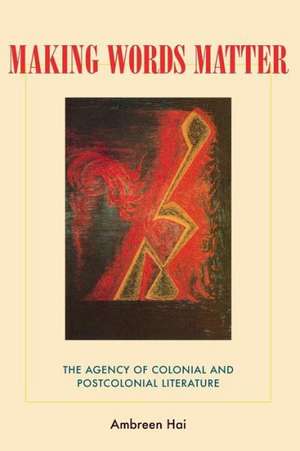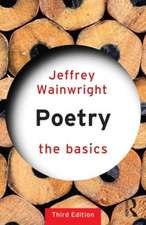Making Words Matter: The Agency of Colonial and Postcolonial Literature
Autor Ambreen Haien Limba Engleză Paperback – 14 iun 2009
Why should Salman Rushdie describe his truth telling as an act of swallowing impure “haram” flesh from which the blood has not been drained? Why should Rudyard Kipling cast Kim, the imperial child–agent, as a body/text written upon and damaged by empire? Why should E. M. Forster evoke through the Indian landscape the otherwise unspeakable racial or homosexual body in his writing? In Making Words Matter: The Agency of Colonial and Postcolonial Literature, Ambreen Hai argues that these writers focus self–reflectively on the unstable capacity of words to have material effects and to be censored, and that this central concern with literary agency is embedded in, indeed definitive of, colonial and postcolonial literature.
Making Words Matter contends that the figure of the human body is central to the self–imagining of the text in the world because the body uniquely concretizes three dimensions of agency: it is at once the site of autonomy, instrumentality, and subjection. Hai’s work exemplifies a new trend in postcolonial studies: to combine aesthetics and politics and to offer a historically and theoretically informed mode of interpretation that is sophisticated, lucid, and accessible.
This is the first study to identify and examine the rich convergence of issues and to chart their dynamic. Hai opens up the field of postcolonial literary studies to fresh questions, engaging knowledgeably with earlier scholarship and drawing on interdisciplinary theory to read both well known and lesser–known texts in a new light. It should be of interest internationally to students and scholars in a variety of fields including British, Victorian, modernist, colonial, or postcolonial literary studies, queer or cultural studies, South Asian studies, history, and anthropology.
Making Words Matter contends that the figure of the human body is central to the self–imagining of the text in the world because the body uniquely concretizes three dimensions of agency: it is at once the site of autonomy, instrumentality, and subjection. Hai’s work exemplifies a new trend in postcolonial studies: to combine aesthetics and politics and to offer a historically and theoretically informed mode of interpretation that is sophisticated, lucid, and accessible.
This is the first study to identify and examine the rich convergence of issues and to chart their dynamic. Hai opens up the field of postcolonial literary studies to fresh questions, engaging knowledgeably with earlier scholarship and drawing on interdisciplinary theory to read both well known and lesser–known texts in a new light. It should be of interest internationally to students and scholars in a variety of fields including British, Victorian, modernist, colonial, or postcolonial literary studies, queer or cultural studies, South Asian studies, history, and anthropology.
| Toate formatele și edițiile | Preț | Express |
|---|---|---|
| Paperback (1) | 236.70 lei 6-8 săpt. | |
| Ohio University Press – 14 iun 2009 | 236.70 lei 6-8 săpt. | |
| Hardback (1) | 480.80 lei 6-8 săpt. | |
| Ohio University Press – 14 iun 2009 | 480.80 lei 6-8 săpt. |
Preț: 236.70 lei
Nou
Puncte Express: 355
Preț estimativ în valută:
45.30€ • 47.02$ • 37.77£
45.30€ • 47.02$ • 37.77£
Carte tipărită la comandă
Livrare economică 22 martie-05 aprilie
Preluare comenzi: 021 569.72.76
Specificații
ISBN-13: 9780821418819
ISBN-10: 0821418815
Pagini: 392
Dimensiuni: 152 x 229 x 25 mm
Greutate: 0.54 kg
Ediția:1
Editura: Ohio University Press
Colecția Ohio University Press
ISBN-10: 0821418815
Pagini: 392
Dimensiuni: 152 x 229 x 25 mm
Greutate: 0.54 kg
Ediția:1
Editura: Ohio University Press
Colecția Ohio University Press
Recenzii
“This book enriches our appreciation of three of the most important writers of the twentieth century, while forwarding an original thesis with potential applicability to many postcolonial writers.“—Carey Snyder, author of British Fiction and Cross–Cultural Encounters: Ethnographic Modernism from Wells to Woolf
“The literary-critical readings that form the core of (Making Words Matter) are superb, and both literary scholars and those from disciplines in the social sciences will find the analyses elegant and rigorous.”—The Journal of Asian Studies
“Hai’s work exemplifies a new trend in postcolonial studies: to combine aesthetics and politics and to offer a historically and theoretically informed mode of interpretation that is sophisticated, lucid, and accessible. Making Words Matter is the first study to identify and examine the rich convergence of issues and to chart their dynamic. Hai opens up the field of postcolonial literary studies to fresh questions, engaging knowledgeably with earlier scholarship and drawing on interdisciplinary theory to read both well known and lesser-known texts in a new light.”—SirReadaLot.org
“This book is the most assiduous to date, and may one day be recognized as the most assiduous ever, on the central colonial/postcolonial dynamic of word and body, the body making words, and making them matter, and—the tables turned—words themselves having a hand in materially creating and substantially shaping, though sometimes disfiguring and even destroying, bodies of various kinds.”—Brian May, Author of The Modernist as Pragmatist: E. M. Forster and the Fate of Liberalism
Notă biografică
Ambreen Hai is an associate professor of English literature and language at Smith College, where she teaches literary theory and Anglophone postcolonial and British literature. Her previous publications include articles on Kipling, Forster, Rushdie, Sidwa, Suleri, and Dangarembga.
Descriere
Why should Salman Rushdie describe his truth telling as an act of swallowing impure “haram” flesh from which the blood has not been drained? Why should Rudyard Kipling cast Kim, the imperial child–agent, as a body/text written upon and damaged by empire?
















